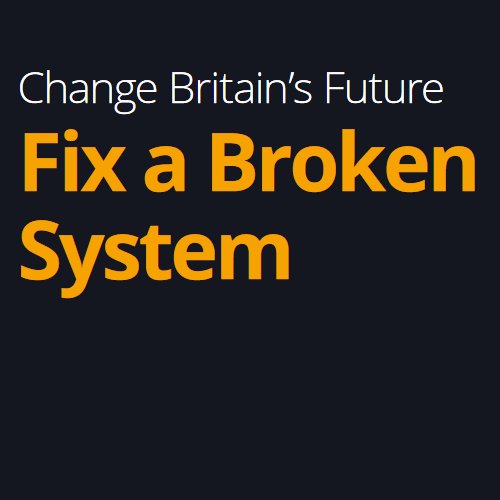Fix a Broken System is part of the Liberal Democrats Parties 2017 General Election Manifesto.
Liberal Democrats Manifesto 2017 PDF Format

Lib Dems Manifesto 2017 – Fix A Broken System
Liberal Democrats Manifesto 2017 – Fix a Broken System
Britain suffers from an overcentralised political system with a lack of openness and accountability. Parliament is unrepresentative of the electorate and weak in restraining the power of the government, we still have an unelected House of Lords, local government is hobbled by central control, and people feel they have no effective means of making known their concerns and priorities. It’s no wonder people feel frustrated and angry at the system.
This anger found its most recent expression in the result of the EU referendum, but ironically this was as much a verdict on the performance of British political institutions as European ones. The Conservatives’ proposed Great Repeal Bill threatens to centralise power even more, handing to central government powers to alter vast swathes of the statute book without proper parliamentary scrutiny.
We believe in a United Kingdom where people have power over their own lives and how their country is run. To make this happen we need to revitalise our political system – strengthen devolution, make the argument that we are stronger together than we are apart, and increase trust in our institutions.
Our priorities in the next parliament will be:
- Creating a better democracy with a fair voting system in local government and Westminster, with votes at 16 and preventing evasion of constituency election spending limits.
- Delivering on our promises to Scotland in full, devolving more powers to Wales and securing the political stability of the Northern Ireland Assembly.
- Meeting the needs of England with ‘devolution on demand’, letting local areas take control of the services that matter most to them.
9.1 Better politics
Unfair votes, overcentralisation of decision-making, the power of patronage and the influence of powerful corporate lobbies mean ordinary citizens and local communities are too often excluded and left alienated by politics today. We need to reform British politics to make it more representative and more empowering of our citizens so it earns greater public confidence. We will :
- Introduce votes at 16 for all elections and referendums across the UK.
- Ensure that every reasonable effort is made to ensure that those people legally entitled to vote are included on the electoral registers, with far greater efforts in particular to register under-represented groups such as young people qualifying for the first time and students moving to universities.
- Introduce the Single Transferable Vote for local government elections in England and for electing MPs across the UK.
- Enable all UK citizens living abroad to vote for MPs in separate overseas constituencies, and to participate in UK referendums.
- Reform the House of Lords with a proper democratic mandate.
- Take big money out of politics by capping donations to political parties at £10,000 per person each year, and introducing wider reforms to party funding along the lines of the 2011 report of the Committee on Standards in Public Life.
- Strengthen trade union members’ political freedoms by letting them choose which political party they wish to support through the political levy.
- Cancel the boundary review due to report in 2018.
While new constituencies would need to be established for a new voting system, we believe constituency boundary reviews should respect natural geographical communities, with greater flexibility for the Boundary Commission to deviate from exact equality to take account of community ties and continuity of representation, and should take place every 10 years.
- Mandate the provision of televised leaders’ debates in general elections based on rules produced by Ofcom relating to structure and balance, and allowing for the empty-chairing of party leaders who refuse to attend.
- Strengthen and expand the lobbying register and prohibit MPs from accepting paid lobbying work.
- Introduce trials of weekend voting to help raise turnouts in elections.
- Introduce legislation to allow for all-BAME and all-LGBT+ parliamentary shortlists.
- Make parliament more family friendly, and establish a review to pave the way for MP job-sharing arrangements.
The recent media, police and Electoral Commission investigations into possible breaches of spending limits by candidates in the 2015 general election show that the current system is not fit for purpose. The clear objective must be to ensure that all expenditure on campaign material targeted at an identifiable constituency, and in particular at voters within that constituency, is included in its expense return, rather than it being possible to count against a national party limit.
We do not believe that political parties themselves have an incentive to change the existing system. We will therefore task the Electoral Commission with producing a framework for an up-to-date expenses system that adequately governs the running of a modern campaign, and put these proposals to a vote in parliament.
9.2 A decentralised United Kingdom
Liberal Democrats have a proud record of leading the way on giving greater powers to the nations of the UK. Now we must deliver on the promises made to the people of Scotland and the rest of the UK to further decentralise power. We will deliver home rule to each of the nations of a strong, federal and united United Kingdom.
Change has been taking place rapidly. We now need to make sure all the new arrangements work together coherently and we will therefore establish a UK
constitutional convention, made up of representatives of the political parties, academia, civic society and members of the public, tasked with producing a full, codified constitution for the UK, to report within two years.
We will work with devolved parliaments and assemblies to allocate to them any powers repatriated as a result of Brexit in their areas of responsibility, and ensure that the devolution of any repatriated powers or responsibilities does not disadvantage the nations of the UK.
9.3 Scotland
After the 2014 independence referendum, Liberal Democrats in the UK government established the Smith Commission to bring together Scotland’s five biggest parties to agree what further powers should be assigned to the Scottish Parliament. Liberal Democrats ensured the package of powers agreed reflects Scotland’s priorities.
The Scottish Parliament will raise in tax half of what it spends in its budget. A Scottish welfare system will allow the Scottish Parliament to change the benefits regime where there is specific Scottish need or priority, with a starting budget of around £3 billion.
These powers and more will deliver for people in Scotland an empowered and accountable Scottish Parliament in a strong and secure United Kingdom.
Our plans for a written, federal constitution will include a permanent Scottish Parliament that could only be abolished by the sovereign will of the Scottish people.
We will work hard to ensure that Scotland remains a part of the United Kingdom.
We will oppose a second independence referendum and oppose independence.
Scotland benefits from being inside the UK and EU single markets. Each is worth billions of pounds and supports tens of thousands of Scottish jobs. Under the Liberal Democrats inclusion in those single markets will continue. Keeping the UK in the EU will remove the basis for the SNP’s divisive proposed referendum on independence.
9.4 Wales
We welcome the new Wales Act, which is intended to implement the St David’s Day agreement secured by Liberal Democrats in government – but it does not go far enough.
Liberal Democrats will deliver proper home rule for Wales and a Welsh Parliament by implementing the remaining Silk part 1 proposals on financial powers and the Silk part 2 proposals to devolve powers over transport, youth justice, policing and other justice powers.
We will raise the status of the National Assembly to become a Welsh Parliament, strengthening its capacity to scrutinise legislation and to hold the Welsh Government to account. We will drastically reduce the number of reserved subjects and prevent Westminster from being able to override Wales on devolved matters. We will recognise Wales as a distinct legal jurisdiction. Among other powers which we would devolve are funding of Network Rail in relation to the Wales network, allowing the Welsh Government to set its own bank holidays and giving the Children’s Commissioner for Wales the power to examine issues that affect children in Wales but are not within the control of the Welsh Government.
To help create jobs and boost growth in Wales we will abolish the economically distorting tolls on the Severn Bridge, after the costs have been recouped in 2018.
9.5 Northern Ireland
Liberal Democrats wish to see a permanently peaceful, stable, non-sectarian and truly democratic society in Northern Ireland. We will work constructively with the political parties in Northern Ireland and with the Irish government to secure the political stability of the Northern Ireland Assembly and other institutions of the Belfast agreement and the implementation of all the recommendations of the report on disbanding paramilitary groups. In particular we are determined to:
- Maintain the common travel area and freedom of movement.
- Support local businesses by ensuring participation within the single market and customs union.
- Ensure that the international human rights protections hard wired into the Good Friday Agreement are not compromised.
- Protect the rights of Northern Ireland citizens living and working in the EU, and EU citizens living and working in Northern Ireland.
- Protect the current financial settlement and the funding of programmes supporting peace and reconciliation in Northern Ireland.
To grow the economy, tackle social exclusion, overcome inequality and deliver efficiencies in public services, Liberal Democrats will support policies and initiatives, such as integrated education, that promote sharing over separation and counter the cost of division.
9.6 England
Devolution of power to Scotland, Wales and Northern Ireland has implications for the UK parliament and its dual role in legislating for England as well as the federal UK. It is possible that a future UK government could use the support of MPs representing Scotland, Wales or Northern Ireland to secure the passage of legislation that only affects England, even if the majority in England were opposed. This would be a key issue for our proposed constitutional convention to address.
Liberal Democrats support an English-only stage in legislation affecting England, so English MPs can have a separate say on laws that only affect England. However, this should be on a proportional basis, genuinely reflecting the balance of opinion in England.
In some areas of England there is a greater appetite for powers, but not every part of the country wants to move at the same speed and there cannot be a one-size-fits-all approach. All areas should however have access to the same opportunities and mayoral authorities should not be ranked higher in terms of the powers with which they can be granted. We will therefore introduce ‘devolution on demand’, enabling even greater devolution of powers from Westminster to councils or groups of councils working together – for example to a Cornish Assembly or a Yorkshire Parliament.
9.7 Funding
The nations of the United Kingdom have long had different needs with regard to funding. The Barnett formula is the mechanism used to adjust spending allocations across the UK.
The Liberal Democrats have already delivered a substantial extension of financial powers to the nations of the UK and we will devolve further fiscal powers to the devolved governments. In order to ensure reliable funding we will retain the Barnett formula and the agreed fiscal framework as the basis for future spending allocations for Scotland and Northern Ireland. This will protect the individual nations’ budgets from external shocks.
We recognise the findings of the Holtham commission that the current formula underfunds Wales, and will commission work to update this analysis. We will address the imbalance by immediately ensuring that the Barnett floor is set at a level that reflects the need for Wales to be funded fairly, and seek over a parliament to increase the Welsh block grant to an equitable level.
This manifesto sets out Liberal Democrat policies and priorities for the United Kingdom. The Scottish and Welsh Liberal Democrats set their own policy on devolved matters, and for those policy areas, the proposals here apply to England only. Our sister party, the Alliance Party of Northern Ireland, makes its own policy on devolved issues in Northern Ireland.
Liberal Democrats Parties 2017 General Election Manifesto
Liberal Democrats Manifesto 2017 – Introduction
Liberal Democrats Manifesto 2017 – Protect Britain’s Place in Europe
Liberal Democrats Manifesto 2017 – Save our NHS and Social Care Services
Liberal Democrats Manifesto 2017 – Put Children First
Liberal Democrats Manifesto 2017 – Build an Economy that Works for You
Liberal Democrats Manifesto 2017 – Keep our Country Green
Liberal Democrats Manifesto 2017 – Support Families and Communities
Liberal Democrats Manifesto 2017 – Defend Rights, Promote Justice and Equalities
Liberal Democrats Manifesto 2017 – Make a Better World
Liberal Democrats Manifesto 2017 – Fix a Broken System















